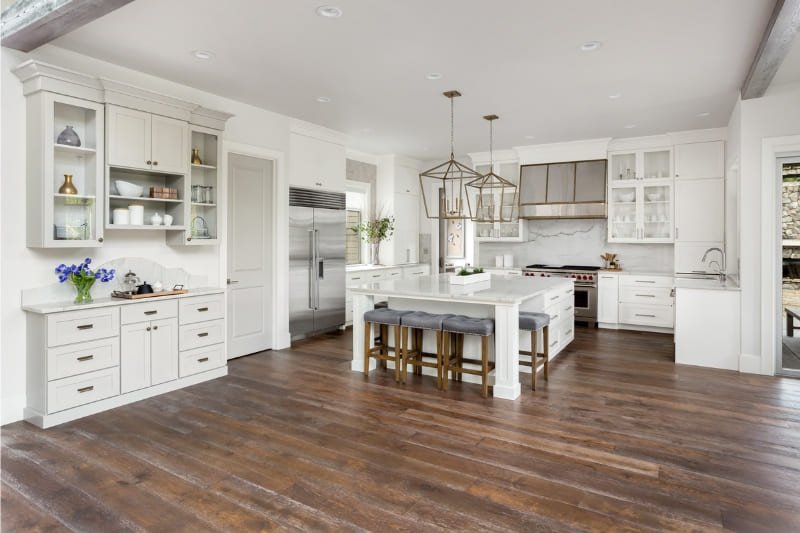Carpet vs Hardwood Flooring Showdown: Comfort or Elegance?
When redesigning or renovating your home, choosing between carpet vs hardwood flooring can be a significant decision. Both options offer distinct advantages that uniquely impact your home’s aesthetics, comfort, and functionality. This guide will provide the essential information to understand these popular flooring choices. Considering the factors explored here, you can make an informed decision that perfectly complements your vision and lifestyle. Alright, let’s begin right away.
Understanding Hardwood Flooring
What is Hardwood Flooring?
Hardwood flooring is a classic and durable option for homeowners, renowned for its enduring beauty. Made from solid woods like oak, maple, walnut, and many other beautiful species, it adds a warm, elegant touch to any room. Hardwood offers a range of colors, textures, and finishes to suit diverse tastes and complement various interior styles, enhancing your home’s overall appeal for years.

Types of Hardwood Flooring
There are two main types of hardwood flooring:
- Solid Hardwood: This classic type consists of a single piece of wood, offering exceptional durability and the ability to be sanded and refinished multiple times for a refreshed look throughout its long lifespan.
- Engineered Hardwood: Constructed with multiple wood layers and topped with a hardwood veneer, engineered hardwood boasts increased stability and adaptability to various environments, including moisture-prone areas.
Advantages of Hardwood Flooring
Hardwood floors provide:
- Timeless Beauty: Their natural wood grains and rich colors create a classic, elegant look that complements any décor style and never goes out of fashion.
- Durability: Hardwood can withstand busy households’ daily wear and tear, making it an excellent choice for high-traffic areas and homes with pets or children.
- Low Maintenance: Unlike carpets, hardwood requires minimal upkeep – regular sweeping or vacuuming and occasional mopping will keep the floors pristine.
- Allergy-Friendly: Hardwood provides a haven for those with allergies since it doesn’t trap dust mites, pollen, and other allergens like carpets do.
- Added Home Value: Hardwood floors are a desirable feature that can significantly increase your property’s resale value, making them a wise investment for homeowners.
Beyond the Basics: Deep Dive into Carpet and Hardwood Construction
Dig deeper into hardwood and carpet choices. Explore construction types, finishes, fiber options, and the impact these have on the look and feel of your floors.
Hardwood Milling and Finishes: Beyond the Wood Species
Choosing the right hardwood involves more than just selecting your favorite wood type. Solid vs. engineered construction offers different benefits and stability. Additionally, consider plank widths (wide creates a spacious feel, narrow is more classic), grain patterns (affects the visual texture of the floor), and stain colors. Sealing techniques range from a natural-looking matte finish to a high gloss that showcases the wood’s depth.
Carpet Fibers and Construction: A World of Textures
The world of carpet goes beyond color! Fibers like nylon (durability), wool (luxurious), and polyester (versatile) each have unique benefits. Carpet comes in cut pile (plush, shows footprints), loop pile (hides wear, durable), and textured varieties. Carpet density matters for comfort, and remember the padding underneath, which impacts both softness and insulation.
Understanding Carpet Flooring
What is Carpet Flooring?
Carpet flooring is a popular choice for homeowners seeking comfort and versatility. It comprises nylon, polyester, or polypropylene, offering a cozy, plush feel underfoot. Carpets come in vast styles, colors, and textures, allowing ultimate customization to match your unique décor and preferences. Whether you desire a luxurious deep pile for a touch of elegance or a practical low-pile option for high-traffic areas, there’s a carpet to suit your needs and style.

Advantages of Carpet Flooring
Carpeting offers:
- Softness and Comfort: Carpets’ plush texture provides a luxuriously comfortable surface, making them a favorite for bedrooms, living rooms, and any space where you want to relax and unwind.
- Insulation: Carpets act as natural insulators, helping to maintain warmth in winter and keeping rooms cool during hot weather, potentially reducing energy bills.
- Safety: Carpets’ soft cushioning helps minimize the impact of slips and falls, making them safer choices for homes with young children or older individuals.
- Versatility: The sheer variety of styles, colors, textures, and patterns available in carpeting means you’ll easily find an option to complement any decor scheme.
- Cost-Effectiveness: Carpet is often a more budget-friendly flooring option than hardwood and can be replaced in sections if needed, minimizing costs over time.
Key Difference Between Carpet and Hardwood
| Factor | Carpet Flooring | Hardwood Flooring |
| Appearance | Provides warmth and a soft look with endless textures and colors | Provides a rich, sophisticated look with its natural grain and hue variations |
| Cost Considerations | Less costly upfront, but may need more frequent replacements. | More expensive initially but provides long-term savings and value enhancement |
| Installation | Generally easier and quicker to install, often a DIY project | Can be installed through various methods like nail-down or floating |
| Durability | Requires more care, susceptible to stains and wear, and needs regular cleaning | Highly durable, can be refinished |
| Lifespan | Has a shorter lifespan, typically 5-15 years, depending on quality and maintenance | Can last for decades with proper care and maintenance |
| Environmental Impact | Comprises synthetic materials and adhesive that can off-gas VOCs | Made from natural and renewable resources |
| Maintenance | Requires regular vacuuming, occasional professional cleaning | Easy to clean with regular sweeping and occasional mapping |
Making the Right Choice: Carpet or Hardwood?
Appearance
Hardwood: Its natural wood grains, rich colors, and smooth finish exude timeless elegance and warmth. Hardwood’s luxurious appearance effortlessly complements various interior styles, from traditional to contemporary.
Carpet: This soft, plush surface offers endless customization options through its vast colors, patterns, and textures. Carpet brings a cozy and inviting feel to any room, allowing you to create a space that reflects your taste.
The Best Choice: Hardwood often wins for its lasting elegance and ability to enhance a space’s overall look.
Cost
Hardwood: While it requires a larger initial investment, hardwood flooring offers exceptional durability and longevity. It significantly boosts your home’s resale value, making it a wise investment that can lead to savings in the long run.
Carpet: Carpet provides a more budget-friendly upfront cost, making it attractive for cost-conscious homeowners. However, it’s important to consider the potential need for frequent replacement due to wear, tear, and staining, which can increase your overall flooring expenses over time.
The Best Choice: Hardwood is often a better long-term investment due to its durability and positive impact on home value.
If you want to learn about the cost of engineered hardwood, read our other blog, “Decoding Costs: How Much Does Engineered Hardwood Flooring Cost?“
Installation
Hardwood: Provides flexibility with multiple installation methods (glue-down, nail-down, floating), allowing homeowners to choose the option that best suits their needs and preferences. While it can be a DIY project for experienced homeowners, many choose professional installation to ensure optimal results.
Carpet: Installation is generally more straightforward and often suitable for DIY projects, making it a good option for budget-conscious homeowners. Carpet installation is typically less expensive than hardwood, adding to its initial affordability.
The Best Choice: Hardwood provides more flexibility in installation methods. While carpet installation may be simpler, hardwood’s benefits often make it the preferred choice.

Durability
Hardwood: Exceptionally durable, hardwood floors resist scratches, dents, and heavy foot traffic. They can last for decades or even centuries with proper care and maintenance. Hardwood’s multiple refinishing abilities ensure that it maintains its beauty and extends its lifespan.
Carpet: While comfortable, carpet is more susceptible to wear and tear, staining, and matting, especially in high-traffic areas. Carpets typically need replacement every 5-10 years, making them a less durable flooring option in the long run.
The Best Choice: Hardwood is the most durable choice, withstanding heavy use and maintaining its appeal over a much longer lifespan.
Lifespan
Hardwood: Boasts an impressively long lifespan, often lasting for decades or even centuries when properly cared for. The ability to refinish hardwood floors multiple times extends their lifespan even further, ensuring they maintain their beauty and value for generations.
Carpet: Has a significantly shorter lifespan, typically 5-15 years. Carpets are prone to wear, tear, staining, and fading over time, necessitating more frequent replacement than hardwood’s enduring nature.
The Best Choice: Hardwood is the clear winner in terms of lifespan. It lasts significantly longer and has a refinishable ability for continued beauty.
If you want to learn about the lifespan of engineered hardwood, read our other blog, “How Long Does Engineered Hardwood Last?“
Environmental Impact
Hardwood: It can be sustainably sourced (look for FSC certification). Its long lifespan and potential for recycling decrease waste. We must consider concerns about deforestation.
Carpet: Often made from non-renewable synthetic fibers, with harmful manufacturing processes. A shorter lifespan leads to more frequent replacement and disposal. Some eco-friendly options exist.
The Best Choice: Responsibly sourced hardwood is generally more environmentally friendly due to its longer lifespan and potential for sustainable practices.
Maintenance
Hardwood: Easy to maintain with regular sweeping/vacuuming and occasional mopping. We can refinish it to address scratches and restore shine.
Carpet: Requires more intensive cleaning, including regular vacuuming and periodic steam/professional cleaning. Prone to staining and trapping allergens.
The Best Choice: Hardwood wins in terms of ease of maintenance. Its simple cleaning routine and refinishable ability make it a less demanding flooring option.
If you want to learn about the different ways to maintain engineered hardwood, read our other blog, “How To Clean Engineered Hardwood Floors“

Soundproofing Your Space: Noise Control with Carpet vs. Hardwood
Understand how your flooring choice impacts the noise level in your home. Learn how to minimize or enhance sound transmission based on your needs.
Footsteps and Impact Noise: How Flooring Affects Sound Transmission
Carpets excel at dampening noise, their soft fibers absorbing footsteps and reducing echoes. It is ideal for bedrooms and multi-story homes. On the other hand, Hardwood tends to amplify sounds like footsteps and dropped objects, making it a less-than-ideal choice for rooms where quiet is a priority.
Solutions and Considerations: Reducing Noise with Either Choice
If you love hardwood’s look but not the noise, underlayments can help reduce sound transmission. Area rugs strategically placed in high-traffic areas provide softness and noise reduction. For those who choose carpet, opting for denser carpets and thicker padding will minimize noise. Even simple choices like wearing slippers indoors can make a difference!
Eco-Conscious Flooring Choices: Sustainability Considerations
Make informed decisions about your flooring’s environmental impact. Discover how certifications and material choices affect sustainability.
Responsible Sourcing: Look for Certifications
Responsibly sourced hardwood carries the FSC (Forest Stewardship Council) certification, ensuring sustainable forestry practices. Similarly, look for carpet certifications like Green Label Plus, which indicate low VOC emissions for better indoor air quality.
Beyond the Initial Purchase: Lifespan and Disposal
Hardwood’s longevity is unmatched. It can last for generations with proper care, and refinishing offers a refresh without a full replacement. Carpet, unfortunately, has a limited lifespan and eventually ends up in landfills. This ongoing replacement cycle has a greater environmental impact over time.
Upgrade Your Home with Timeless Engineered Hardwood
Seeking a flooring upgrade? Hardwood offers unmatched elegance, durability, and increased home value compared to carpet. It’s also easier to clean and exceptionally long-lasting. For the best of both worlds, consider engineered hardwood!
Villagio Wood Floors is your California wholesaler for premium engineered hardwood to suit any decorating style. Experience its stability and moisture resistance, plus the timeless beauty of real wood. Our wide selection ensures the perfect match for your style and decor. Let us help you create a space that balances comfort and timeless elegance.
Carpet vs Hardwood – FAQs
Is carpet safer than hardwood?
Yes! Carpets are safer than hardwood. Its softer surface reduces the risk of slips and falls, especially for young and elderly individuals.
Can old carpets be harmful?
Yes! Old carpets can be harmful. They trap allergens, dust mites, mold, and other contaminants, contributing to poor indoor air quality and worsening respiratory problems. Regular cleaning helps, but you must eventually replace old carpets for a healthier home environment.
What are the disadvantages of carpets?
Some of the disadvantages of carpets are:
- Staining: Prone to spills and difficult stains.
- Matting: Wear and tear in high-traffic areas.
- Allergens: Trap dust mites, pollen, and pet dander.
- Maintenance: Requires frequent vacuuming and professional cleaning.
- Environmental Impact: Often made from non-renewable materials.
- Lifespan: Shorter than hardwood, needing replacement every 5-15 years.
Which is cheaper, carpet or hardwood?
Carpets are generally cheaper upfront. However, hardwood provides better long-term value due to its low maintenance and extended lifespan.
How to tell if a carpet is bad?
Look for signs of wear, matting, or persistent odors that indicate it’s time for a replacement. Additionally, if the carpets feel stiff or worn down, it may be time for a replacement.










